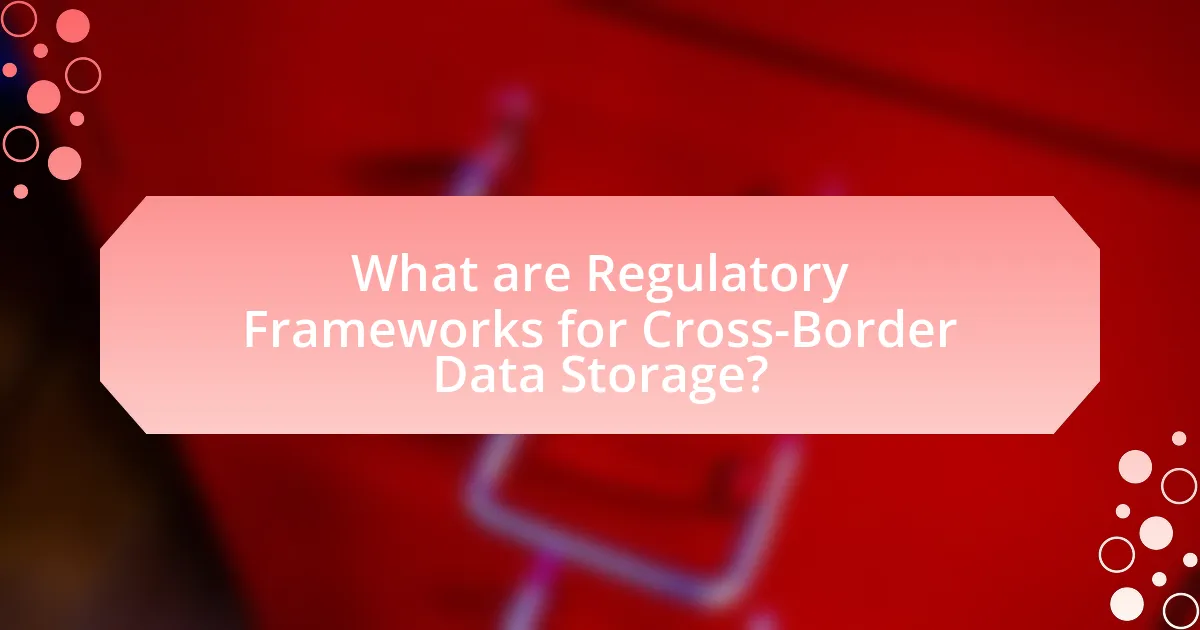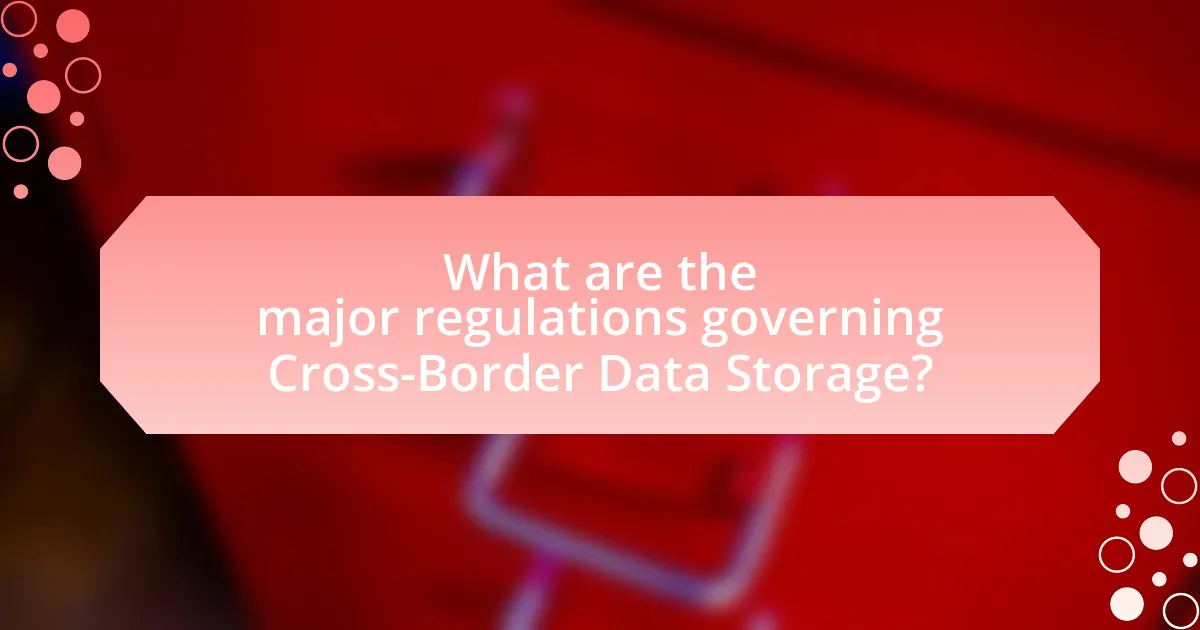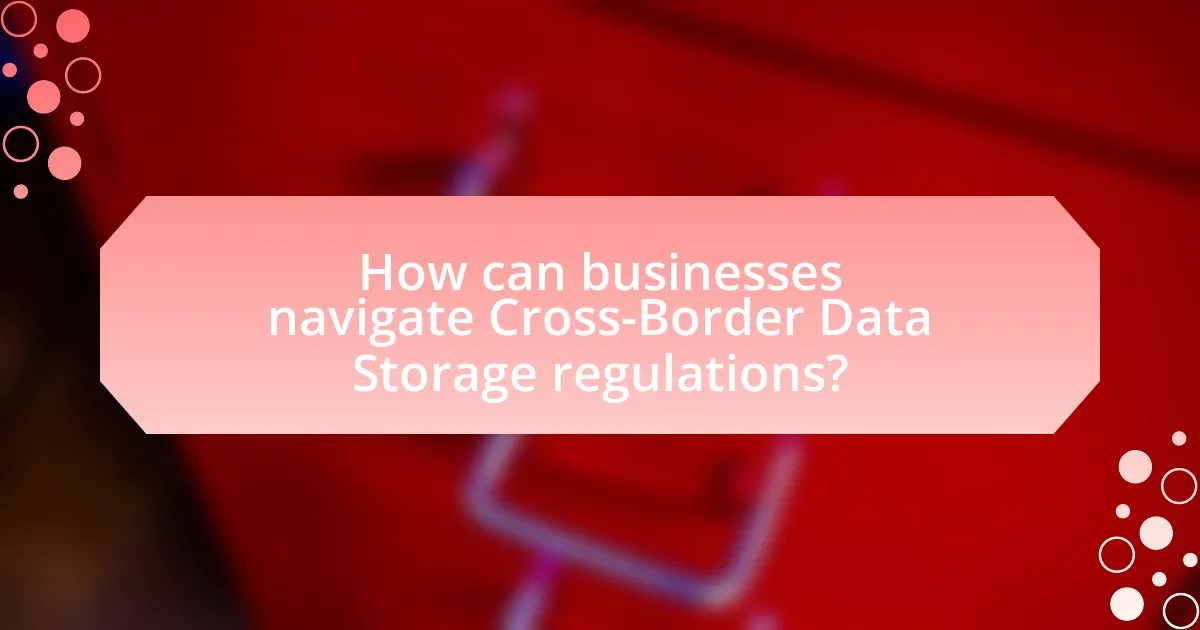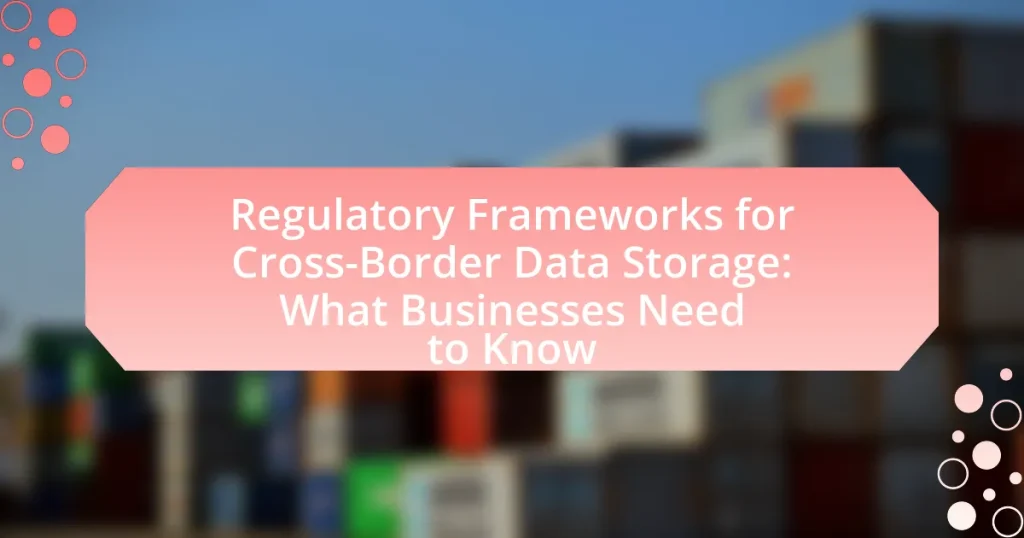Regulatory frameworks for cross-border data storage are essential legal structures that dictate how data can be transferred, stored, and processed across national borders. Key regulations include the General Data Protection Regulation (GDPR) in the European Union, the California Consumer Privacy Act (CCPA) in the United States, and the Personal Information Protection and Electronic Documents Act (PIPEDA) in Canada. These frameworks are crucial for businesses to ensure compliance, mitigate risks of legal penalties, and protect consumer data. The article will explore the importance of these regulations, the risks associated with non-compliance, and best practices for businesses to navigate the complexities of cross-border data storage effectively.
What are Regulatory Frameworks for Cross-Border Data Storage?

 |
|
Regulatory frameworks for cross-border data storage are legal structures that govern how data can be transferred, stored, and processed across national borders. These frameworks include regulations such as the General Data Protection Regulation (GDPR) in the European Union, which mandates that personal data can only be transferred outside the EU if the receiving country ensures an adequate level of data protection. Additionally, the United States has sector-specific regulations like the Health Insurance Portability and Accountability Act (HIPAA) for healthcare data, which also impacts cross-border data practices. Compliance with these frameworks is essential for businesses to avoid legal penalties and ensure data security.
Why are Regulatory Frameworks important for businesses?
Regulatory frameworks are important for businesses because they establish the legal and operational guidelines that ensure compliance with laws and standards. These frameworks help businesses mitigate risks associated with legal penalties, financial losses, and reputational damage by providing clear rules for data handling, privacy, and security. For instance, the General Data Protection Regulation (GDPR) in the European Union imposes strict requirements on data protection, and non-compliance can result in fines up to 4% of annual global turnover. Thus, adherence to regulatory frameworks not only safeguards businesses from legal repercussions but also fosters trust with customers and stakeholders by demonstrating a commitment to ethical practices.
What risks do businesses face without proper regulatory compliance?
Businesses face significant risks without proper regulatory compliance, including legal penalties, financial losses, and reputational damage. Non-compliance can lead to fines that may reach millions of dollars, as seen in cases like the GDPR violations where companies faced penalties up to 4% of their annual global turnover. Additionally, businesses may experience operational disruptions due to investigations or audits, which can hinder productivity. Furthermore, the loss of customer trust can result in decreased sales and long-term damage to brand reputation, as consumers increasingly prioritize data protection and ethical practices.
How do regulatory frameworks protect consumer data?
Regulatory frameworks protect consumer data by establishing legal standards and guidelines that organizations must follow to ensure data privacy and security. These frameworks, such as the General Data Protection Regulation (GDPR) in the European Union, mandate that businesses implement measures like data encryption, access controls, and regular audits to safeguard personal information. Compliance with these regulations is enforced through penalties and fines for violations, which incentivizes organizations to prioritize consumer data protection. For example, under GDPR, companies can face fines of up to 4% of their annual global turnover for non-compliance, demonstrating the serious implications of failing to protect consumer data.
What are the key components of Cross-Border Data Storage regulations?
The key components of Cross-Border Data Storage regulations include data localization requirements, compliance with local privacy laws, and international data transfer mechanisms. Data localization mandates that certain types of data must be stored within the jurisdiction where they were collected, as seen in regulations like the General Data Protection Regulation (GDPR) in the European Union. Compliance with local privacy laws ensures that organizations adhere to specific legal frameworks governing data protection in each country, which can vary significantly. International data transfer mechanisms, such as Standard Contractual Clauses (SCCs) and Binding Corporate Rules (BCRs), facilitate lawful data transfers across borders while ensuring adequate protection of personal data, as established by various legal precedents and regulatory guidelines.
What types of data are affected by these regulations?
The types of data affected by these regulations include personal data, sensitive personal data, and business-related data. Personal data refers to any information that relates to an identified or identifiable individual, such as names, addresses, and identification numbers. Sensitive personal data encompasses more specific categories, including health information, racial or ethnic origin, political opinions, and sexual orientation, which require stricter handling due to their sensitive nature. Business-related data, which may include trade secrets and proprietary information, is also subject to regulations to protect corporate interests and intellectual property. These classifications are critical as they determine the level of compliance required under various regulatory frameworks, such as the General Data Protection Regulation (GDPR) in the European Union, which mandates stringent protections for personal and sensitive data.
How do different jurisdictions define data storage and transfer?
Different jurisdictions define data storage and transfer through specific legal frameworks that govern how data can be collected, stored, and shared across borders. For instance, the European Union’s General Data Protection Regulation (GDPR) establishes strict guidelines for data transfer outside the EU, requiring that data be transferred only to countries with adequate data protection laws or through mechanisms like Standard Contractual Clauses. In contrast, the United States has a more fragmented approach, with sector-specific regulations such as the Health Insurance Portability and Accountability Act (HIPAA) for health data and the California Consumer Privacy Act (CCPA) for consumer data, which outline different requirements for data storage and transfer. These definitions are crucial for businesses to understand, as non-compliance can lead to significant legal penalties and operational challenges.
What are the major regulations governing Cross-Border Data Storage?

 |
|
The major regulations governing Cross-Border Data Storage include the General Data Protection Regulation (GDPR) in the European Union, the California Consumer Privacy Act (CCPA) in the United States, and the Personal Information Protection and Electronic Documents Act (PIPEDA) in Canada. GDPR mandates strict data protection and privacy standards for personal data transferred outside the EU, requiring adequate protection measures. CCPA enhances privacy rights for California residents, impacting businesses that handle personal data across borders. PIPEDA governs how private sector organizations collect, use, and disclose personal information in Canada, including cross-border data transfers. These regulations collectively shape the legal landscape for cross-border data storage, ensuring that data protection standards are upheld internationally.
How does the General Data Protection Regulation (GDPR) impact businesses?
The General Data Protection Regulation (GDPR) significantly impacts businesses by imposing strict data protection and privacy requirements. Businesses must ensure compliance with regulations regarding the collection, processing, and storage of personal data, which includes obtaining explicit consent from individuals and providing them with rights to access, rectify, and delete their data. Non-compliance can result in substantial fines, reaching up to 4% of annual global turnover or €20 million, whichever is higher, as established by the GDPR. This regulatory framework necessitates that businesses invest in data protection measures, conduct regular audits, and implement privacy policies to safeguard personal information, thereby influencing operational practices and costs.
What are the main requirements of GDPR for data storage?
The main requirements of GDPR for data storage include ensuring data is processed lawfully, stored securely, and retained only as long as necessary for its purpose. Organizations must implement appropriate technical and organizational measures to protect personal data against unauthorized access, loss, or damage. Additionally, data subjects have rights regarding their data, including the right to access, rectify, and erase their information. Compliance with these requirements is essential to avoid penalties, as GDPR imposes fines of up to 4% of annual global turnover or €20 million, whichever is higher, for violations.
How can businesses ensure compliance with GDPR?
Businesses can ensure compliance with GDPR by implementing robust data protection policies and practices. This includes conducting regular data audits to identify personal data, ensuring that data processing activities are documented, and obtaining explicit consent from individuals before collecting their data. Additionally, businesses must appoint a Data Protection Officer (DPO) if required, provide training to employees on data protection principles, and establish procedures for data breach notifications within the stipulated 72-hour timeframe. Compliance can be further supported by utilizing privacy impact assessments to evaluate risks associated with data processing activities.
What role do other international regulations play?
Other international regulations play a crucial role in shaping the legal landscape for cross-border data storage by establishing standards that govern data protection, privacy, and security. These regulations, such as the General Data Protection Regulation (GDPR) in the European Union, set stringent requirements for how businesses handle personal data, influencing global practices. For instance, GDPR mandates that companies must ensure adequate protection for data transferred outside the EU, compelling organizations worldwide to adopt similar data protection measures to comply with these regulations. This interconnectedness of international regulations fosters a more uniform approach to data governance, enhancing consumer trust and facilitating smoother cross-border operations.
How does the California Consumer Privacy Act (CCPA) compare to GDPR?
The California Consumer Privacy Act (CCPA) and the General Data Protection Regulation (GDPR) both aim to enhance consumer privacy rights, but they differ significantly in scope and enforcement. The CCPA applies primarily to businesses operating in California and focuses on consumer rights regarding personal data, such as the right to know, the right to delete, and the right to opt-out of data sales. In contrast, the GDPR has a broader application across the European Union and imposes stricter requirements on data processing, including the necessity for explicit consent and the appointment of a Data Protection Officer for certain organizations. Additionally, GDPR fines can reach up to 4% of annual global turnover, while CCPA penalties are generally lower, with fines of up to $7,500 per violation. These differences highlight the varying levels of consumer protection and regulatory rigor between the two frameworks.
What are the implications of the Asia-Pacific Economic Cooperation (APEC) Privacy Framework?
The implications of the Asia-Pacific Economic Cooperation (APEC) Privacy Framework include enhanced cross-border data flow, improved privacy protection standards, and increased trust among businesses and consumers. The framework establishes a set of principles that member economies can adopt to ensure that personal information is handled consistently and securely, facilitating international trade and cooperation. By aligning privacy practices, APEC aims to reduce barriers to data transfer, which is crucial for businesses operating in multiple jurisdictions. The framework also encourages the development of domestic privacy laws that reflect its principles, thereby promoting a harmonized approach to data protection across the Asia-Pacific region.
How can businesses navigate Cross-Border Data Storage regulations?

 |
|
Businesses can navigate Cross-Border Data Storage regulations by implementing a comprehensive compliance strategy that includes understanding the specific legal requirements of each jurisdiction involved. This involves conducting thorough assessments of data protection laws, such as the General Data Protection Regulation (GDPR) in the European Union, which mandates strict guidelines for data transfer outside its borders. Additionally, businesses should utilize data transfer mechanisms like Standard Contractual Clauses (SCCs) or Binding Corporate Rules (BCRs) to ensure lawful data transfers. Regular audits and employee training on data privacy practices further enhance compliance and mitigate risks associated with cross-border data storage.
What strategies can businesses implement for compliance?
Businesses can implement several strategies for compliance with regulatory frameworks for cross-border data storage. First, they should conduct a thorough risk assessment to identify potential compliance gaps related to data handling and storage practices. This assessment enables businesses to understand the specific regulations applicable to their operations, such as the General Data Protection Regulation (GDPR) in Europe or the California Consumer Privacy Act (CCPA) in the United States.
Next, businesses should establish clear data governance policies that outline data management practices, including data classification, access controls, and retention schedules. These policies should be regularly reviewed and updated to reflect changes in regulations or business operations.
Training employees on compliance requirements is also crucial. Regular training sessions ensure that staff are aware of their responsibilities regarding data protection and compliance, reducing the risk of unintentional violations.
Additionally, businesses can implement technology solutions, such as encryption and data masking, to protect sensitive information during storage and transmission. These technologies help mitigate risks associated with data breaches and unauthorized access.
Finally, engaging with legal and compliance experts can provide businesses with insights into the evolving regulatory landscape, ensuring that their compliance strategies remain effective and up-to-date.
How can businesses assess their current data storage practices?
Businesses can assess their current data storage practices by conducting a comprehensive audit of their data management systems. This audit should include evaluating the types of data stored, the storage methods used, compliance with relevant regulations such as GDPR or CCPA, and the security measures in place to protect sensitive information. According to a 2021 report by the International Association of Privacy Professionals, 79% of organizations reported that they faced challenges in complying with data protection regulations, highlighting the importance of regular assessments to ensure compliance and security.
What tools and resources are available for regulatory compliance?
Regulatory compliance tools and resources include compliance management software, legal databases, and industry-specific guidelines. Compliance management software, such as LogicManager and ComplyAdvantage, helps organizations track regulations and manage compliance processes efficiently. Legal databases like Westlaw and LexisNexis provide access to up-to-date legal information and case law, which is essential for understanding regulatory requirements. Additionally, industry-specific guidelines from organizations such as the International Organization for Standardization (ISO) and the General Data Protection Regulation (GDPR) offer frameworks that businesses can follow to ensure compliance with cross-border data storage regulations.
What are the best practices for Cross-Border Data Storage?
The best practices for cross-border data storage include ensuring compliance with local data protection laws, implementing robust data encryption, and establishing clear data transfer agreements. Compliance with regulations such as the General Data Protection Regulation (GDPR) in Europe is crucial, as it mandates specific requirements for data handling and storage across borders. Data encryption protects sensitive information during transit and at rest, reducing the risk of unauthorized access. Additionally, clear data transfer agreements outline the responsibilities and liabilities of parties involved, ensuring accountability and legal protection. These practices collectively help mitigate risks associated with cross-border data storage while adhering to regulatory requirements.
How can businesses ensure data security during cross-border transfers?
Businesses can ensure data security during cross-border transfers by implementing robust encryption protocols and adhering to international data protection regulations. Encryption protects sensitive information from unauthorized access during transmission, while compliance with regulations such as the General Data Protection Regulation (GDPR) and the California Consumer Privacy Act (CCPA) establishes legal frameworks that mandate data security measures. These regulations require businesses to conduct risk assessments, implement data protection by design, and ensure that third-party vendors also comply with security standards, thereby reinforcing the overall security of cross-border data transfers.
What should businesses consider when choosing data storage providers?
Businesses should consider compliance with regulatory frameworks when choosing data storage providers. This includes understanding data protection laws such as the General Data Protection Regulation (GDPR) in Europe, which mandates strict guidelines on data handling and storage. Additionally, businesses must evaluate the provider’s security measures, including encryption and access controls, to protect sensitive information. The provider’s geographical location is also crucial, as it can affect data sovereignty and compliance with local laws. Furthermore, businesses should assess the provider’s reputation and reliability, including uptime guarantees and customer support, to ensure consistent access to data.
What common challenges do businesses face in Cross-Border Data Storage?
Businesses face several common challenges in cross-border data storage, primarily related to regulatory compliance, data privacy, and security concerns. Regulatory compliance is complex due to varying laws across jurisdictions, such as the General Data Protection Regulation (GDPR) in Europe, which imposes strict rules on data handling and transfer. Data privacy issues arise as businesses must navigate different cultural attitudes towards privacy and consent, which can complicate data management strategies. Additionally, security concerns are heightened in cross-border scenarios, as data may be more vulnerable to breaches during international transfers. These challenges necessitate robust legal frameworks and security measures to ensure compliance and protect sensitive information.
How can businesses overcome legal and logistical barriers?
Businesses can overcome legal and logistical barriers by implementing comprehensive compliance strategies and leveraging technology for efficient operations. Establishing a thorough understanding of the regulatory frameworks governing cross-border data storage is essential, as it allows businesses to navigate legal requirements effectively. For instance, adhering to the General Data Protection Regulation (GDPR) ensures that companies manage personal data in compliance with European standards, thus avoiding legal penalties. Additionally, utilizing cloud services that offer data localization options can help businesses meet specific legal requirements while optimizing logistical processes. By integrating these strategies, businesses can mitigate risks associated with legal and logistical challenges in cross-border operations.
What are the consequences of non-compliance with data storage regulations?
Non-compliance with data storage regulations can lead to significant legal and financial consequences for businesses. Organizations may face hefty fines, which can reach millions of dollars depending on the severity of the violation and the specific regulations breached, such as the General Data Protection Regulation (GDPR) in Europe, where fines can be up to 4% of annual global turnover or €20 million, whichever is higher. Additionally, non-compliance can result in reputational damage, loss of customer trust, and potential lawsuits from affected individuals or entities. Furthermore, businesses may be subjected to increased scrutiny from regulatory bodies, leading to more frequent audits and oversight, which can disrupt operations and incur additional costs.
What practical tips can businesses follow for effective Cross-Border Data Storage?
To achieve effective cross-border data storage, businesses should prioritize compliance with local regulations and international data protection laws. This involves understanding the specific legal requirements of each jurisdiction where data is stored, such as the General Data Protection Regulation (GDPR) in the European Union, which mandates strict data handling and transfer protocols. Additionally, businesses should implement robust data encryption methods to protect sensitive information during transit and at rest, ensuring that even if data is intercepted, it remains secure. Regular audits and assessments of data storage practices can help identify potential vulnerabilities and ensure ongoing compliance with evolving regulations. Furthermore, establishing clear data governance policies that outline roles and responsibilities related to data management can enhance accountability and streamline compliance efforts.


